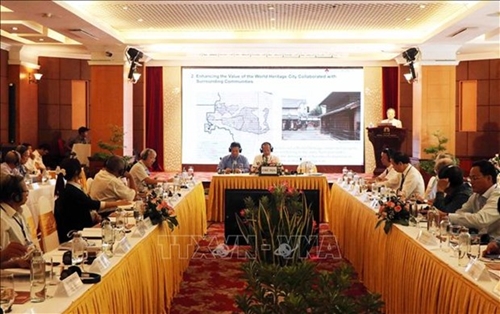August 09, 2023 | 21:09 (GMT+7)
Workshop seeks to promote Hue city's cultural landscapes
The Hue Monuments Conservation Center in coordination with Japan’s Waseda University held a workshop on August 9 to exchange views on preserving cultural landscapes of the Hue heritage and surrounding areas so as to devise plans and policies to develop its cultural and historical values.
It also aims to improve the efficiency of heritage conservation and management in association with sustainable tourism development of the Hue heritage urban area.
    |
 |
|
At the event co-organized by the Hue Monuments Conservation Center and Japan’s Waseda University on August 9 to exchange views on preserving cultural landscapes of the Hue heritage and surrounding areas |
According to researchers, under the Nguyen Dynasty, important architectural clusters were designed in line with feng shui elements such as mountains, hills, rivers and streams, especially lakes. These are the cultural characteristics that make up the outstanding value of the world cultural heritage in Hue Imperial Ancient Citadel, they said.
At the workshop, experts and researchers exchanged views relating to the management of heritage buffer zones, the planning of building the Hue ancient citadel in history, the conservation of cultural landscapes in Hue Heritage urban area and feng shui elements in the planning of the imperial tombs of kings of the Nguyen Dynasty.
Shigeru Satoh, Professor Emeritus of the Waseda University, said that in addition to protecting the landscapes of relics in line with regulations, it is necessary for the locality to develop community-based eco-tourism around the imperial tombs of Kings Gia Long and Thieu Tri to guide local citizens to live with the heritages and protect them sustainably.
According to Director of the Hue Monuments Conservation Center Hoang Viet Trung, the workshop’s outcome will supplement the study of a master plan on the conservation and restoration of the Complex of Hue Monuments until 2030, with a vision to 2050 and compile a dossier for re-nominating it as a World Heritage Cultural Landscape as recommended by the UNESCO and the Ministry of Culture, Sports and Tourism.
Source: VNA